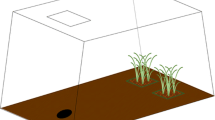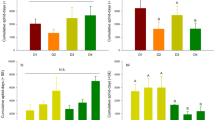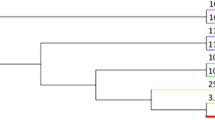Abstract
Much research has explored the effects of plant species diversity on herbivore populations, but far less has considered effects of plant genotypic diversity, or how abiotic stressors, like drought, can modify effects. Mechanisms by which plant genotypic diversity affects herbivore populations remain largely unresolved. We used greenhouse studies with a model system of wheat (Triticum aestivum L.) and bird cherry-oat aphid (Rhopalosiphum padi L.) to determine whether the genotypic diversity of a plant’s neighborhood influences performance and fitness of herbivores on a focal plant and if drought changes the influence of neighborhood diversity. Taken across all varieties we tested, plant–plant interactions in diverse neighborhoods reduced aphid performance and generated associational resistance, although effects on aphids depended on variety identity. In diverse mixtures, drought stress greatly diminished the genotypic diversity-driven reduction in aphid performance. Neighborhood diversity influenced mother aphid size, and appeared to partially explain how plant–plant interactions reduced the number of offspring produced in mixtures. Plant size did not mediate effects on aphid performance, although neighborhood diversity reduced plant mass across varieties and watering treatments. Our results suggest inter-varietal interactions in genotypic mixtures can affect herbivore performance in the absence of herbivore movement and that abiotic stress may diminish any effects. Accounting for how neighborhood diversity influences resistance of an individual plant to herbivores will help aid development of mixtures of varieties for managing insect pests and clarify the role of plant genotypic diversity in ecosystems.





Similar content being viewed by others
References
Andow DA (1991) Vegetational diversity and arthropod population response. Annu Rev Entomol 36:561–586. doi:10.1146/annurev.en.36.010191.003021
Atkinson NJ, Urwin PE (2012) The interaction of plant biotic and abiotic stresses: from genes to the field. J Exp Bot 63:3523–3543. doi:10.1093/jxb/ers100
Barbosa P, Hines J, Kaplan I et al (2009) Associational resistance and associational susceptibility: having right or wrong neighbors. Annu Rev Ecol Evol Syst 40:1–20. doi:10.1146/annurev.ecolsys.110308.120242
Behmer ST, Simpson SJ, Raubenheimer D (2014) Herbivore foraging in chemically heterogeneous environments: nutrients and secondary metabolites. Ecology 83:2489–2501. doi:10.1890/0012-9658(2002)083[2489:HFICHE]2.0.CO;2
Biedrzycki ML, Bais HP (2010) Kin recognition in plants: a mysterious behaviour unsolved. J Exp Bot 61:4123–4128. doi:10.1093/jxb/erq250
Cahill JF Jr (2002) Interactions between root and shoot competition vary among species. Oikos 99:101–112. doi:10.1034/j.1600-0706.2002.990111.x
Chen BJW, During HJ, Anten NPR (2012) Detect thy neighbor: identity recognition at the root level in plants. Plant Sci 195:157–167. doi:10.1016/j.plantsci.2012.07.006
Cook-Patton SC, McArt SH, Parachnowitsch AL et al (2011) A direct comparison of the consequences of plant genotypic and species diversity on communities and ecosystem function. Ecology 92:915–923. doi:10.1890/10-0999.1
Cowger C, Weisz R (2008) Winter wheat blends (mixtures) produce a yield advantage in North Carolina. Agron J 100:169–177. doi:10.2134/agronj2007.0128
Crutsinger GM, Collins MD, Fordyce JA et al (2006) Plant genotypic diversity predicts community structure and governs an ecosystem process. Science 313:966–968. doi:10.1126/science.1128326
Crutsinger GM, Reynolds WN, Classen AT, Sanders NJ (2008) Disparate effects of plant genotypic diversity on foliage and litter arthropod communities. Oecologia 158:65–75. doi:10.1007/s00442-008-1130-y
Delory BM, Delaplace P, Fauconnier M-L, du Jardin P (2016) Root-emitted volatile organic compounds: can they mediate belowground plant–plant interactions? Plant Soil 402:1–26. doi:10.1007/s11104-016-2823-3
Dı́az S, Cabido M (2001) Vive la différence: plant functional diversity matters to ecosystem processes. Trends Ecol Evol 16:646–655. doi:10.1016/S0169-5347(01)02283-2
Dixon AFG (1976) Timing of egg hatch and viability of the sycamore aphid, Drepanosiphum platanoidis (Schr.), at bud burst of sycamore, Acer pseudoplatanus L. J Anim Ecol 45:593–603. doi:10.2307/3893
Dudley S, File A (2007) Kin recognition in an annual plant. Biol Lett 3:435–438. doi:10.1098/rsbl.2007.0232
File AL, Murphy GP, Dudley SA (2012) Fitness consequences of plants growing with siblings: reconciling kin selection, niche partitioning and competitive ability. Proc R Soc B 279:209–218. doi:10.1098/rspb.2011.1995
Finch S, Collier RH (2000) Host-plant selection by insects—a theory based on “appropriate/inappropriate landings” by pest insects of cruciferous plants. Entomol Exp Appl 96:91–102. doi:10.1023/A:1004058518179
Foster W, Benton T (1992) Sex ratio, local mate competition and mating behaviour in the aphid Pemphigus spyrothecae. Behav Ecol Sociobiol 30:297–307
Genung MA, Crutsinger GM, Bailey JK et al (2012) Aphid and ladybird beetle abundance depend on the interaction of spatial effects and genotypic diversity. Oecologia 168:167–174. doi:10.1007/s00442-011-2080-3
Glinwood R, Pettersson J, Ahmed E et al (2003) Change in acceptability of barley plants to aphids after exposure to allelochemicals from couch-grass (Elytrigia repens). J Chem Ecol 29:261–274. doi:10.1023/A:1022687025416
Glinwood R, Ahmed E, Qvarfordt E et al (2009) Airborne interactions between undamaged plants of different cultivars affect insect herbivores and natural enemies. Arthropod Plant Interact 3:215–224. doi:10.1007/s11829-009-9072-9
Glinwood R, Ninkovic V, Pettersson J (2011) Chemical interaction between undamaged plants—effects on herbivores and natural enemies. Phytochemistry 72:1683–1689. doi:10.1016/j.phytochem.2011.02.010
Grettenberger I, Tooker J (2015) Moving beyond resistance management toward an expanded role for seed mixtures in agriculture. Agric Ecosyst Environ 208:29–36. doi:10.1016/j.agee.2015.04.019
Hambäck PA, Inouye B, Andersson P, Underwood N (2014) Effects of plant neighborhoods on plant–herbivore interactions: resource dilution and associational effects. Ecology 95:1370–1383. doi:10.1890/13-0793.1
Huberty AF, Denno RF (2004) Plant water stress and its consequences for herbivorous insects: a new synthesis. Ecology 85:1383–1398. doi:10.1890/03-0352
Hughes AR, Inouye BD, Johnson MTJ et al (2008) Ecological consequences of genetic diversity. Ecol Lett 11:609–623. doi:10.1111/j.1461-0248.2008.01179.x
Johnson MTJ, Agrawal AA (2005) Plant genotype and environment interact to shape a diverse arthropod community on evening primrose (Oenothera biennis). Ecology 86:874–885. doi:10.1890/04-1068
Johnson MTJ, Lajeunesse MJ, Agrawal AA (2006) Additive and interactive effects of plant genotypic diversity on arthropod communities and plant fitness. Ecol Lett 9:24–34. doi:10.1111/j.1461-0248.2005.00833.x
Karban R, Yang LH, Edwards KF (2014) Volatile communication between plants that affects herbivory: a meta-analysis. Ecol Lett 17:44–52. doi:10.1111/ele.12205
Karley SJ, Douglas AE, Parker WE (2002) Amino acid composition and nutritional quality of potato leaf phloem sap for aphids. J Exp Biol 205:3009–3018
Kellner M, Brantestam AK, Ahman I, Ninkovic V (2010) Plant volatile-induced aphid resistance in barley cultivars is related to cultivar age. Theor Appl Genet 121:1133–1139. doi:10.1007/s00122-010-1377-7
Kiær L, Skovgaard I, Østergård H (2006) Meta-analysis is a powerful tool to summarize variety mixture effects—exemplified by grain yield and weed suppression of spring barley. In: Proceedings of the COST SUSVAR workshop on cereal crop diversity: implications for production and products, La Besse, France, pp 49–52
Kieckhefer RW, Kantack BH (1988) Yield losses in winter grains caused by cereal aphids (Homoptera: Aphididae) in South Dakota. J Econ Entomol 81:317–321. doi:10.1093/jee/81.1.317
Kotowska AM, Cahill JF Jr, Keddie BA (2010) Plant genetic diversity yields increased plant productivity and herbivore performance. J Ecol 98:237–245. doi:10.1111/j.1365-2745.2009.01606.x
Letourneau DK, Armbrecht I, Rivera BS et al (2011) Does plant diversity benefit agroecosystems? A synthetic review. Ecol Appl 21:9–21. doi:10.1890/09-2026.1
McArt SH, Thaler JS (2013) Plant genotypic diversity reduces the rate of consumer resource utilization. Proc R Soc B 280:20130639. doi:10.1098/rspb.2013.0639
Mulder CP, Uliassi DD, Doak DF (2001) Physical stress and diversity–productivity relationships: the role of positive interactions. Proc Natl Acad Sci 98:6704–6708. doi:10.1073/pnas.111055298
Mundt CC (2002) Use of multiline cultivars and cultivar mixtures for disease management. Annu Rev Phytopathol 40:381–410. doi:10.1146/annurev.phyto.40.011402.113723
Nicol CMY, Mackauer M (1999) The scaling of body size and mass in a host parasitoid association: influence of host species and stage. Entomol Exp Appl 90:83–92. doi:10.1046/j.1570-7458.1999.00425.x
Ninkovic V, Glinwood R, Dahlin I (2009) Weed–barley interactions affect plant acceptance by aphids in laboratory and field experiments. Entomol Exp Appl 133:38–45. doi:10.1111/j.1570-7458.2009.00900.x
Peltonen-Sainio P, Karjalainen R (1991) Agronomic evaluation of growing oat cultivar mixtures under various stress conditions in Finland. Acta Agric Scand 41:47–53. doi:10.1080/00015129109438582
Poveda K, Gómez M, Martínez E (2008) Diversification practices: their effect on pest regulation and production. Rev Colomb Entomol 34:131–144
Power AG (1988) Leafhopper response to genetically diverse maize stands. Entomol Exp Appl 49:213–219. doi:10.1111/j.1570-7458.1988.tb01182.x
Power AG (1991) Virus spread and vector dynamics in genetically diverse plant populations. Ecology 72:232–241. doi:10.2307/1938917
Prieto I, Violle C, Barre P et al (2015) Complementary effects of species and genetic diversity on productivity and stability of sown grasslands. Nat Plants 1:1–5. doi:10.1038/nplants.2015.33
Reusch TBH, Ehlers A, Hämmerli A, Worm B (2005) Ecosystem recovery after climatic extremes enhanced by genotypic diversity. Proc Natl Acad Sci 102:2826–2831. doi:10.1073/pnas.0500008102
Schädler M, Brandl R, Haase J (2007) Antagonistic interactions between plant competition and insect herbivory. Ecology 88:1490–1498. doi:10.1890/06-0647
Schlapfer F, Schmid B (1999) Ecosystem effects of biodiversity: a classification of hypotheses and exploration of empirical results. Ecol Appl 9:893–912. doi:10.1890/1051-0761(1999)009[0893:EEOBAC]2.0.CO;2
Schmelz EA, Engelberth J, Alborn HT et al (2003) Simultaneous analysis of phytohormones, phytotoxins, and volatile organic compounds in plants. Proc Natl Acad Sci 100:10552–10557. doi:10.1073/pnas.1633615100
Schmelz EA, Engelberth J, Tumlinson JH et al (2004) The use of vapor phase extraction in metabolic profiling of phytohormones and other metabolites. Plant J 39:790–808. doi:10.1111/j.1365-313X.2004.02168.x
Shoffner AV, Tooker JF (2013) The potential of genotypically diverse cultivar mixtures to moderate aphid populations in wheat (Triticum aestivum L.). Arthropod Plant Interact 7:33–43. doi:10.1007/s11829-012-9226-z
Simpson SJ, Raubenheimer D (2001) The geometric analysis of nutrient–allelochemical interactions: a case study using locusts. Ecology 82:422–439. doi:10.1890/0012-9658(2001)082[0422:TGAONA]2.0.CO;2
Smithson JB, Lenné JM (1996) Varietal mixtures: a viable strategy for sustainable productivity in subsistence agriculture. Ann Appl Biol 128:127–158. doi:10.1111/j.1744-7348.1996.tb07096.x
Sokal R, Rohlf F (1995) Biometry, 3rd edn. W. H. Freeman and Company, New York
Steudel B, Hautier Y, Hector A, Kessler M (2011) Diverse marsh plant communities are more consistently productive across a range of different environmental conditions through functional complementarity. J Appl Ecol 48:1117–1124. doi:10.1111/j.1365-2664.2011.01986.x
Tahvanainen JO, Root RB (1972) The influence of vegetational diversity on the population ecology of a specialized herbivore, Phyllotreta cruciferae (Coleoptera: Chrysomelidae). Oecologia 10:321–346. doi:10.1007/BF00345736
Tonhasca A, Byrne DN (1994) The effects of crop diversification on herbivorous insects: a meta-analysis approach. Ecol Entomol 19:239–244. doi:10.1111/j.1365-2311.1994.tb00415.x
Tooker JF, Frank SD (2012) Genotypically diverse cultivar mixtures for insect pest management and increased crop yields. J Appl Ecol 49:974–985. doi:10.1111/j.1365-2664.2012.02173.x
Underwood N, Halpern S, Klein C (2011) Effect of host-plant genotype and neighboring plants on strawberry aphid movement in the greenhouse and field. Am Midl Nat 165:38–49. doi:10.1674/0003-0031-165.1.38
Utsumi S, Ando Y, Craig TP, Ohgushi T (2011) Plant genotypic diversity increases population size of a herbivorous insect. Proc R Soc B 278:3108–3115. doi:10.1098/rspb.2011.0239
Walling L (2000) The myriad plant responses to herbivores. J Plant Growth Regul 19:195–216. doi:10.1007/s003440000026
Wolfe M (1985) The current status and prospects of multiline cultivars and variety mixtures for disease. Annu Rev Phytopathol 23:251–273. doi:10.1146/annurev.py.23.090185.001343
Zadok JC, Chang TT, Konzak CF (1974) A decimal code for the growth stages of cereals. Weed Res 14:415–421. doi:10.1111/j.1365-3180.1974.tb01084.x
Acknowledgments
We would like to thank M.E. Barbercheck, J.P. Kaye, M.B. Thomas, and anonymous reviewers for comments that improved this manuscript. Thank you to A.M. Helms for assistance with the phytohormone component of this study. Funding was provided by a United States Department of Agriculture National Institute of Food and Agriculture Predoctoral Fellowship (Grant 11037855) to IMG.
Author contribution statement
IMG and JFT conceived and designed the experiments. IMG performed the experiment and analyzed the data. IMG and JFT wrote the manuscript.
Author information
Authors and Affiliations
Corresponding author
Ethics declarations
Conflict of interest
The authors declare that they have no conflict of interest.
Additional information
Communicated by Ian Kaplan.
Electronic supplementary material
Below is the link to the electronic supplementary material.
Rights and permissions
About this article
Cite this article
Grettenberger, I.M., Tooker, J.F. Inter-varietal interactions among plants in genotypically diverse mixtures tend to decrease herbivore performance. Oecologia 182, 189–202 (2016). https://doi.org/10.1007/s00442-016-3651-0
Received:
Accepted:
Published:
Issue Date:
DOI: https://doi.org/10.1007/s00442-016-3651-0




